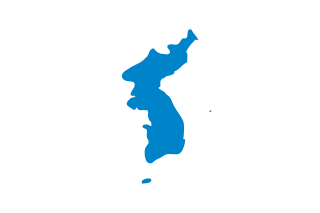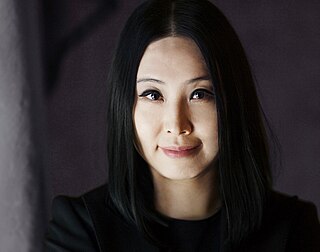| Kyung-hwa | |
| Hangul | 경화 |
|---|---|
| Hanja | 京 和, 敬 和, and others |
| Revised Romanization | Gyeong-hwa |
| McCune–Reischauer | Kyŏnghwa |
Kyung-hwa, also spelled Kyung-wha or Kyong-hwa, is a Korean feminine given name. [1] Its meaning differs based on the hanja used to write each syllable of the name. There are 54 hanja with the reading "kyung" and 15 hanja with the reading "hwa" on the South Korean government's official list of hanja which may be registered for use in given names. [2]

Korea is a region in East Asia. Since 1948, it has been divided between two distinct sovereign states: North Korea and South Korea. Korea consists of the Korean Peninsula, Jeju Island, and several minor islands near the peninsula. Korea is bordered by China to the northwest, Russia to the northeast, and neighbours Japan to the east by the Korea Strait and the Sea of Japan.

Hanja is the Korean name for Chinese characters. More specifically, it refers to those Chinese characters borrowed from Chinese and incorporated into the Korean language with Korean pronunciation. Hanja-mal or Hanja-eo refers to words that can be written with Hanja, and hanmun refers to Classical Chinese writing, although "Hanja" is sometimes used loosely to encompass these other concepts. Because Hanja never underwent major reform, they are almost entirely identical to traditional Chinese and kyūjitai characters, though the stroke orders for some characters are slightly different. For example, the characters 教 and 研 are written as 敎 and 硏. Only a small number of Hanja characters are modified or unique to Korean. By contrast, many of the Chinese characters currently in use in Japan and Mainland China have been simplified, and contain fewer strokes than the corresponding Hanja characters.
Kyung, also spelled Kyoung, Gyeong, Kyeong, or Kyong, is an uncommon Korean family name, as well as a single-syllable Korean given name and an element in many two-syllable Korean given names.
People with this name include:
- Sportspeople
- Yu Kyung-hwa (born 1953), South Korean Olympic volleyball player
- Sung Kyung-hwa (born 1965), South Korean team handball player and Olympic champion
- Park Kyung-hwa (born 1984), South Korean swimmer
- Kim Kyong-hwa (born 1986), North Korean football player
Yu Kyung-Hwa is a Korean former volleyball player who competed in the 1972 Summer Olympics and in the 1976 Summer Olympics.
Sung Kyung-Hwa is a South Korean team handball player and Olympic champion. She received a silver medal with the South Korean team at the 1984 Summer Olympics in Los Angeles. Her team won the gold medals at the 1988 Summer Olympics in Seoul.
Park Kyung-hwa is a South Korean former swimmer, who specialized in butterfly events. She won a bronze medal as a member of the South Korean team in the 4 × 100 m medley relay (4:13.41), when her nation hosted the 2002 Asian Games in Busan.
- Other
- Kyung-wha Chung (born 1948), South Korean violinist
- Kyunghwa Lee (born 1968), South Korean-born American performing artist
- Han Kyeong-hwa (born 1977), South Korean voice actress
- Kang Kyung-wha, South Korean diplomat, United Nations Deputy High Commissioner for Human Rights

KyungHwa Lee (Hangul: 이경화) is a visual artist and new media artist exploring the experimental nature of contemporary art from the perspectives of architecture, fashion, and philosophy.
Han Kyeong-hwa is a South Korean voice actor.

Kang Kyung-wha is the Foreign Minister of South Korea, the first woman nominated for and appointed to the position. She is also the first Korean woman to hold a high-level position in the United Nations. Previously, Kang was the first non-exam-taker to become a director-general in the ministry. Moreover, she is the first South Korean foreign minister to join the official South Korean delegation for the inter-Korean summit as well as to visit Pyongyang, the North Korean capital.